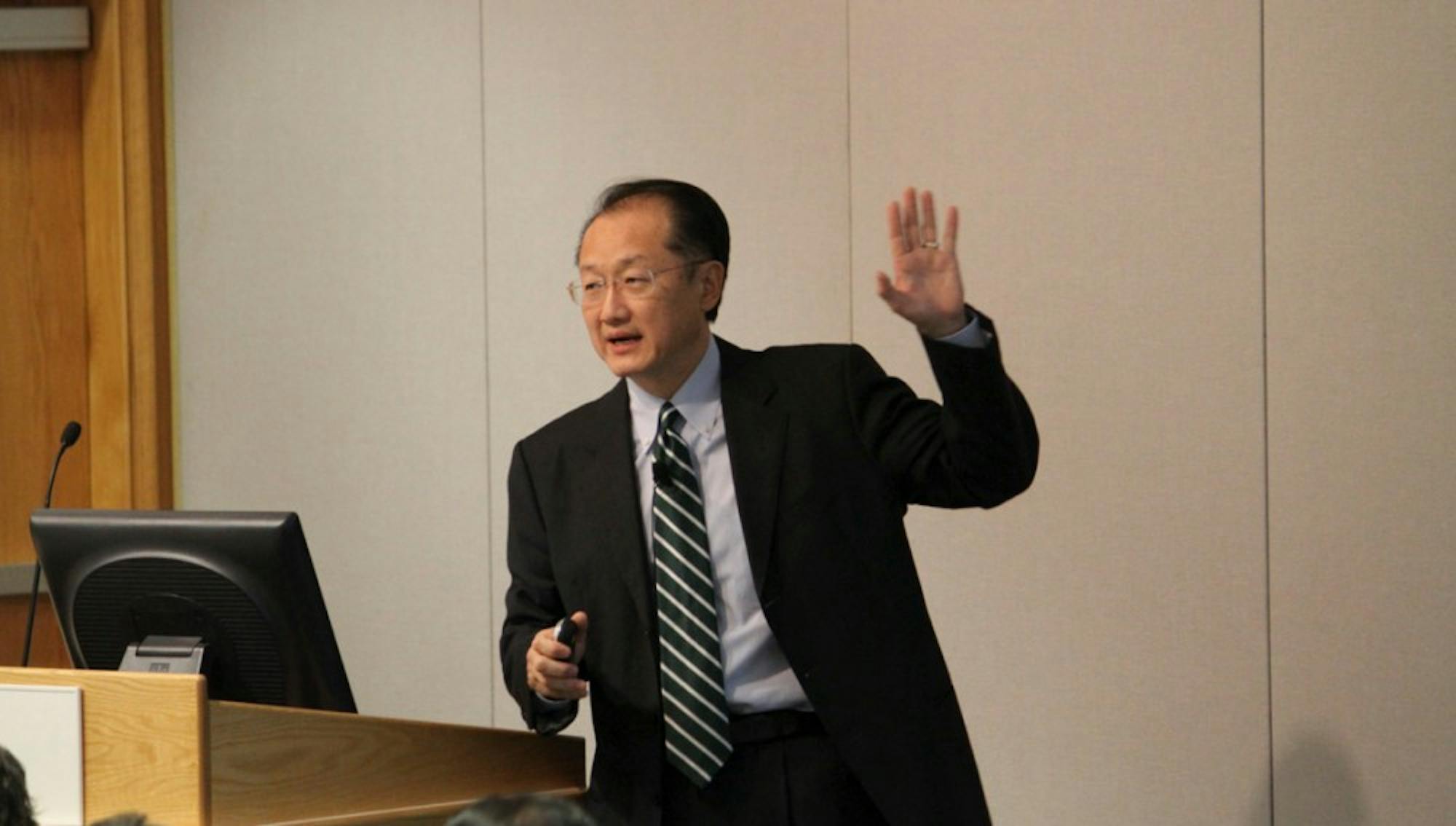Earlier this month, the Development Committee, which includes a board of governors from the joint World Bank-International Monetary Fund forum, announced its approval of the “World Bank Group Strategy,” former College President and current World Bank president Jim Yong Kim’s plan to restructure staff. Kim also announced that he plans to cut $400 million from the bank’s budget over the next three years.
The proposal has elicited mixed responses from the international community and within the bank itself.
In April, Kim announced a plan to internally refocus bank policies to move toward his goal of eradicating global poverty, which he called the “defining moral issue of our time.”
He announced a two-pronged goal of reducing poverty to 3 percent by 2030 and increasing “shared prosperity” by aiding the lowest 40 percent of income earners. In October, Kim announced plans to strategically review staffing. The bank currently has 10,000 staff members, and Kim said clients saw the institution as excessively bureaucratic.
In an interview with CNN, Kim said he plans to organize the bank around 14 global practices, such as agriculture, education, health and nutrition. He hopes to stop providing “mosquito bite solutions” for large issues, such as rapid urbanization in China.
In the spring, when Kim presented his reorganization proposal to the Bank’s shareholders — 25 representatives from the 188 member countries who fund the bank, effectively a microcosm of the international community — they unanimously welcomed the new strategy.
David Theis, a World Bank spokesperson, said 20 of the 25 shareholders signed a joint endorsement that day.
“This ambitious change in agenda — the first major restructuring in a generation — will align the World Bank to deliver on our ambitious goals on ending extreme poverty by 2030 and boosting shared prosperity particularly for the lowest 40 percent in developing countries,” Theis said.
He added that a purposeful reorganization has not occurred at the World Bank in over 17 years. Given the changing nature of international affairs, internal reshuffling is necessary to enhance the bank’s effectiveness, Theis said.
The 1818 Society, a group of World Bank retirees with almost 6,000 members, released a bulletin in September calling Kim’s proposals “patently uninspiring and simply confusing.” The bulletin also said that the “critical issue” of how the bank is funded and its business has fallen by the wayside as internal management “battles” for control of operating staff.
Others have said the change might not be as effective as Kim hopes due to World Bank’s size.
“The World Bank is a huge bureaucracy that has gone through many organizations in the past,” economics professor Douglas Irwin said. “However good the intention, it is very unlikely that another organization or restructuring will fundamentally improve the Bank’s effectiveness.”
Economics professor Eric Edmonds questioned the importance of large organizations such as the World Bank Group, even with such substantial overhauls as Kim proposes, as the bank was created after World War II to help rebuild a war-ravaged Europe.
“It is easy to overstate the World Bank’s role in development finance,” he said in an email. “Private financial flows from high income countries to low income countries are about $322 billion.”
Official development assistance, 29 percent of which is multilateral, totals $134 billion, Edmonds said. Overall, the World Bank contributes less than 2 percent of all funding provided to low-income countries by high-income countries.
The New York Times reported that the reorganization has resulted in internal tensions and the departure of high level, tenured staff.
“It’s a bureaucracy, and to see whether the restructuring works, you’re going to have to see how the money and approval process changes,” said an American worker at the bank, who spoke on the condition that she not be named to discuss her employer candidly to the Times. “A lot of people aren’t going to be happy about it.”
In response to the administrative turnover, Kim said certain policies resulted from individual ambitions for advancement, instead of the greater World Bank mission.
“The incentives sometimes get misaligned with the mission,” he said in the CNN interview. “In other words, if the incentive was good for the career advancement of individuals but maybe not aligned with the strategy a country to end extreme poverty. That is the biggest change we make.”
The Times reported that a recent survey of World Bank employees found the working collaborative environment to be dysfunctional and disjointed. Kim has said his reforms aim to improve efficiency and inter-regional cooperation within the institution and fears if reform is not implemented the bank “could become less than the sum of its parts.”
Kim added that he is aware of the negativity surrounding his reorganization plans.
“Leadership cannot back off because of resistance,” he said. “There will be resistance, there will be noise. But at the end of the day, I am convinced that the organization will work more effectively afterward. I’ve done it twice before, and we’re going to do it again.”




